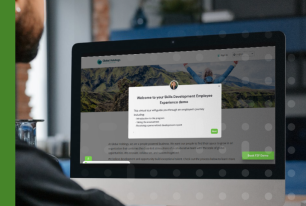A Culture of Care Helps Shape Early Career Experiences
How fostering a culture of care helps organizations retain early career talent and provide meaning at work.
Share
Early in my career, I was very intentional. I was intentional to keep my personal life separate from my workday. At work, I would not talk about my fears. I would not talk about my anxieties. I needed to have it all together, I needed to score high on my performance review and I needed to be considered a high potential. Life was good. I commuted. I worked hard. I exercised and I had great friendships.
Eventually, I got married and had three kids. I had emotions like I had never experienced before. There were new fears and anxieties. It was October 2020, and everything changed. We were living in Colorado and dealing with Covid and the fires. Ash was falling from the sky, and I had not seen the sun in two weeks. The phone rang one morning. It was my nanny, completely hysterical. She had been driving our two youngest, ages one and three, home from preschool. She was screaming “I'm so sorry”, over and over. She had been in a very serious car crash, but everyone was okay. I considered it a second chance at life and re-evaluated every minute of how I spent my time. My husband left his 10-year career with The PGA TOUR and we relocated to Auburn, Alabama, to be within driving distance of our families. I adopted the perspective that time is too short to not be transparent and highly efficient. I aligned my values to a place I could fully be myself and went to work for SHL.
How a culture of care helps achieve purpose
In June of 2022, I traveled to Minneapolis as part of onboarding for my new role. I was in the hotel gym, the morning before my first visit to our US Headquarters. I introduced myself to the only other person there, and it turned out she was also with SHL. Kim Smith was my first friend at the company. When I shared that my family had recently relocated to Auburn she connected me to her sister-in-law and dear friend, Pam Oldham, who lived a mile from my new home.

Pam and I
Pam has a story, unlike anyone I have ever met. She is passionate, fearless, an incredible mother, friend, and executive woman, and has also beat stage 4 Breast Cancer. When I think about what she endured, the years of tribulations, while keeping a positive outlook for her children and family, I feel inspired. Every day we have a choice. A choice of positivity and optimism or the choice of doubt, negativity, and fear.
During our conversation, available on the SHL Smart Teams Podcast, we discuss how Pam's resilience and endurance shape how she shows up at work. As an executive at STC Brands, named for Chick-fil-A’s founder, S. Truett Cathy, Pam has found her calling. Pam describes the legacy Truett created, which drives the organization's purpose "To glorify God by being a faithful steward of all that is entrusted to us. To have a positive influence on all who come in contact with Chick-fil-A." Team members achieve this purpose by creating a culture of care.

The birthplace of the Original Chick-fil-A® Chicken Sandwich
Chick-fil-A is rooted in the corporate values:
- We're here to serve
- We're better together
- We are purpose-driven
- We pursue what's next
Pam explains, "When your career aligns with who you are at your core, you know you’re at the right place."
The importance of early career experiences
As the mother of a graduating senior, Morgan Leigh, Pam offers unique perspectives on what graduates are looking for in the workplace and how to create those environments in your organizations. Be intentional about creating community and connect your interns and early careers talent to purposeful activities that allow them to collaborate and do meaningful work.

Mark, Pam, Morgan Leigh & Trey
I hope Pam’s story encourages us all to reflect on our own careers, and unlike my experience when first entering the workforce, show up as our whole, true selves. Reflecting on the car crash, it was a very difficult time for my family. I know there will be other events in my life that equal or surpass that challenge. For our readers who might be experiencing something, as well, or who will in the future, Pam provides perspectives you may not have considered. By sharing care within our organizations, may we all perform our work with purpose and meaning.
Be intentional about creating community and connect your interns and early careers talent to purposeful activities that allow them to collaborate and do meaningful work.
Biography

Pam Oldham currently serves as Principal Program Lead for STC Brands Inc. Her primary role is to manage and advance the Brand, Communication, and Marketing efforts across the STC Brands concepts, which include The Dwarf House restaurants, Truett’s Chick-fil-A, Truett’s Grill, and Truett’s Luau. The 18 restaurants are located across Georgia and Florida.
Pam was born and raised in Florala, AL, and is a graduate of Auburn University. After college, she met her husband when they both joined the start-up team to launch The Golf Channel in Orlando, FL in January 1995. During their 21 years in Florida, Pam was diagnosed with Stage 4 Metastatic Breast Cancer. Her fight began in Fall 2004 and three years later she was cancer free.
Her professional journey led her to Chick-fil-A in 2015 to serve as Sr. Director, Sales and Brand Growth for two restaurants in Durham, NC. In 2018, she became part of the Chick-fil-A Inc. pilot program as Local CMO, while also serving on the Executive Team for the two South Durham restaurants. In 2020, Pam and her family relocated to Atlanta, GA to serve the STC Brands Inc. team as Lead Advisor, with a specific focus on brand and marketing for STC Brands. Pam and her husband, Mark reside in Auburn, AL. They have two children, Morgan Leigh and Trey.
Resources
- Sometimes it can be difficult for early career talent to articulate their work preferences, skills, and motivations. By implementing SHL’s Graduate Solutions, organizations can objectively assess early career talent and equip them with onboarding reports to allow them to hit the ground running.

Example of Interview questions populating from assessment results
- To better understand your existing teams and to optimize group performance, consider SHL’s Occupational Personality Questionnaire. Provide development reports at scale and have data to plan succession pools and identify high-potentials.
- For additional resources on Positive Psychology, please read the inspiring story of my colleague, Julie Stevens, also a survivor of stage 4 Cancer. Here is a link to her website, as well.
Contact us so we can help you build a meaningful early career experience.









